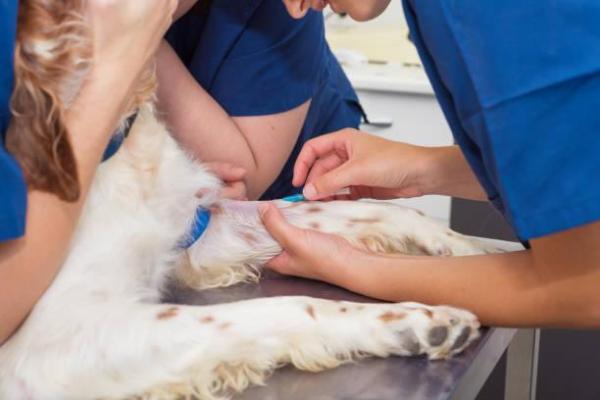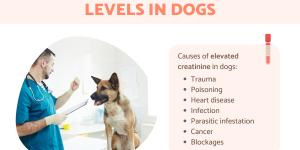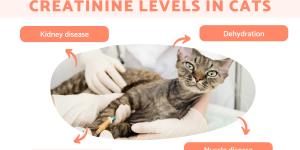High Cholesterol Levels in Dogs



See files for Dogs
We think of the word cholesterol as synonymous with something bad, but it actually refers to essential fats which animals need to develop and maintain their body. It is a natural lipid which is present in almost all cells and it is used in digestion, vitamin D synthesis and hormone production. Only when cholesterol levels in dogs become too high do problems arise. It is not usually a problem if these lipid levels are temporarily raised. It is when the blood cholesterol levels are excessive or chronically high that problems arise. Hypercholesterolemia (also known as hyperlipidemia), high cholesterol is more commonly associated with humans, but it can occur in dogs.
At AnimalWised, we look at high cholesterol levels in dogs. We look at the causes, symptoms and treatment of hypercholesterolemia, as well as how best to prevent it in your canine.
Dogs with high cholesterol
When we talk about high cholesterol in dogs, we are referring to hypercholesterolemia. This is a condition which is a result of continued excessive levels of cholesterol in the bloodstream.
We need to make a distinction between a temporary elevation in cholesterol levels and hypercholesterolemia. There are situations and circumstances during which a dog's blood cholesterol levels can rise. These include situations when they suffer heightened stress, anxiety or fear. In these cases, the levels should normalize a few hours after the negative situation has elapsed.
High cholesterol levels are not the only type of fat which can appear in the blood. Sometimes cholesterol is confused with triglycerides, but the latter refers to unused calories which help to provide energy for the body. If we want to confirm a dog has high cholesterol, we need to observe that the cholesterol remains high after fasting for 8 to 12 hours. The high cholesterol is determined by taking a blood analysis.
Fats are not the only worry for a dog's blood test results. Learn more with are article on normal glucose levels in dogs.
Causes of high cholesterol in dogs
As with people, high cholesterol in dogs can have different causes. It is essential to use the experience and knowledge of a veterinarian. They will be able to evaluate the specific cause of hypercholesterolemia in each patient. They will also possess the necessary equipment to do so.
High cholesterol in dogs is usually associated with congenital anomalies, metabolic problems or an inappropriate diet and a sedentary lifestyle. Below, we summarize the causes and risk factors that may be associated with hypercholesteremia in dogs:
- Pregnancy: pregnant dogs can be especially vulnerable to developing high cholesterol levels, so we must pay special attention to the nutrition of a pregnant dog. We also need to ensure they have the appropriate level of exercise during both the gestation and lactation periods.
- Nephrotic syndrome: this is a degenerative disease that affects the kidneys and is characterized by complex symptoms that include hypercholesteremia, proteinuria (excess proteins in urine) and interstitial edema (fluid build up). It usually develops from a complication of glomerular kidney disease (GERD) in dogs.
- Unbalanced diet: excess of foods rich in fat, dairy or industrialized products.
- Sedentary lifestyle or poor physical activity: when the dog does not perform the exercises required to maintain optimal health and balanced behavior.
- Thyroid problems: issues in the functioning of the thyroid gland (especially canine hypothyroidism).
- Diabetes: can be due to genetics or lifestyle issues.
- Adrenal issues: abnormal and excessive activity of the adrenal glands.
- Pancreatitis: inflammation of the pancreas, usually due to issues with diet and weight. Learn more with our article on pancreatitis in dogs.
- Cholestasis: consists of the total or partial obstruction of the bile ducts that is usually related to problems in the liver or pancreas.
- Old age: older dogs tend to show a greater predisposition to accumulate fat in their body and need special care with their diet and physical activity. They may also be more vulnerable to numerous illnesses and certain behavioral problems. It is essential to provide proper care for elderly dogs, as well as effective preventive medicine.

Symptoms of high cholesterol in dogs
High cholesterol in dogs is usually a silent disease, i.e. its first signs are not very specific and difficult to recognize. For this reason, many dogs are only diagnosed when their symptoms become more advanced. This is also why it is essential to carry out preventive consultations with the veterinarian to carry out the necessary blood tests and guarantee the optimal state of health of our dogs.
Below are the symptoms that are usually associated with high cholesterol in dogs:
- Bruises or patches on the skin
- Abdominal pain.
- Formation of orange or yellowish fat lumps on skin (dermal xanthomas)
- Seizures
- Alterations in the nervous system (leading to behavioral issues)
It is important to note that many of these symptoms are not specific to high cholesterol levels. You can see other issues which may be the cause with our article on why a dog is having seizures.
Treatment for high cholesterol in dogs
When observing one of these symptoms or any changes in the behavior of your dog, you will need to go to a veterinarian immediately. A trained professional will be able to carry out the required tests to confirm the diagnosis of high cholesterol levels. Only then can they determine the right course of treatment for your dog's individual needs. See our article on how to understand a dog's blood test for more information on diagnosis.
The veterinarian will most likely recommend a change in your dog's diet and exercise routine. The aim of these lifestyle changes is to naturally lower the dog's blood cholesterol levels and improve their quality of life. Typically, adult dogs with hypercholesterolemia adopt a commercial feed for dogs with this condition. It should be high in fiber (to help metabolize cholesterol molecules), low in fat (maximum 10%) and high in quality protein.
Depending on the health status of your dog and their cholesterol levels, the veterinarian will assess the need to administer specific drugs. These are designed to help reduce blood fat levels and prevent the development of cholesterol-related diseases and complications.
Do not give human foods or products such as probiotic yogurts which are designed to lower cholesterol. These can cause harm to the dog as it does not meet their nutritional requirements and may negatively affect their health.

How to avoid high cholesterol in dogs?
Preventing high cholesterol in dogs is not only possible, but it is essential to offer an excellent quality of life to our canines. The best preventive measure is to provide complete and balanced nutrition to our companion animals. This will need to be provided according to their age, size, state of health and the specific needs of their body.
Ideally, we should always have the guidance of a veterinarian when deciding the best diet for our dogs. In addition, we should never offer them prohibited foods for dogs. This includes as greasy, fried or industrialized human foods.
It will also be essential to offer our dogs an active life. We need to give them the opportunity to exercise regularly with at least 2 or 3 daily walks of 30 to 40 minutes. This will depend on the specific exercise and health requirements of the individual dog. Preventive visits to the vet every 6 months will also allow us to best ensure the state of health of our faithful companions, as well as to diagnose any imbalance in their organism early.

This article is purely informative. AnimalWised does not have the authority to prescribe any veterinary treatment or create a diagnosis. We invite you to take your pet to the veterinarian if they are suffering from any condition or pain.
If you want to read similar articles to High Cholesterol Levels in Dogs, we recommend you visit our Other health problems category.







